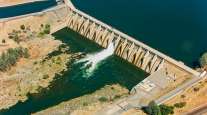President Calls on U.S. to Upgrade Infrastructure
This story appears in the Jan. 31 print edition of Transport Topics.
President Obama said during his State of the Union address that the federal government should “redouble” its efforts to upgrade the nation’s infrastructure, a message met with praise from industry and labor groups.
“Our infrastructure used to be the best, but our lead has slipped,” Obama said during the Jan. 25 speech to Congress. “Countries in Europe and Russia invest more in their roads and railways than we do. . . . Meanwhile, when our own engineers graded our nation’s infrastructure, they gave us a ‘D.’ ”
Obama said the United States has to do better, citing past examples of the interstate highway system and rural electrification.
“The jobs created by these projects didn’t just come from laying down track or pavement,” he said. “They came from businesses that opened near a town’s new train station or the new off-ramp.”
While the speech did not get into specifics, Obama said infrastructure investments would be “fully paid for” and that the government would work to “attract private investment and pick projects based [on] what’s best for the economy, not politicians.”
Before the speech, Deputy Transportation Secretary John Porcari said the administration was developing a “plan that calls for both an upfront investment and the certainty of a multiyear funding approach that will allow states to plan and invest for the long term.”
That plan, he said, also will include an infrastructure bank to finance large projects with regional or national importance.
“Our economy can’t roll along on rusty rails, overburdened roads or congested runways,” Porcari said during the Transportation Research Board’s annual meeting. “Transportation is critical to our nation’s success, and this administration understands it clearly.”
Those investments, Obama said, will “help our companies compete. We also have to knock down barriers that stand in the way of their success.”
By improving competitiveness, Obama said the United States would be able to meet his goal of doubling exports by 2014.
“Already, our exports are up,” he said, citing recent trade deals, while calling on Congress to pass another one with South Korea.
Officials from across the political and ideological spectrum endorsed Obama’s efforts to boost infrastructure.
In a joint statement, U.S. Chamber of Commerce President Thomas Donohue and AFL-CIO President Richard Trumka said the two groups “stand united in applauding President Obama’s call to create jobs and grow our economy through investment in our nation’s infrastructure.”
“Whether it is building roads, bridges, high-speed broadband, energy systems and schools, these projects not only create jobs and demand for businesses, they are an investment in building the modern infrastructure our country needs to compete in a global economy,” the pair said.
“Robust invest by Washington in our nation’s roads, bridges, and transit systems . . . will help create good public and private sector jobs and reinvigorate the economies in our communities allowing our nation and our residents to compete globally for decades to come,” said James Mitchell, president of the National League of Cities.
Sen. Barbara Boxer (D-Calif.), chairwoman of the Senate Environment and Public Works Committee, said the president’s vision was in line with her own on the infrastructure issue.
“We need roads, bridges, high-speed rail and other infrastructure that transport people and goods efficiently in order to move our country forward,” she said.
Boxer’s Republican counterpart, Sen. James Inhofe (R-Okla.) said, during a hearing on transportation and jobs the next day, that “we’ve heard President Obama talk about infrastructure before, but there has been little follow through.”
“I hope he actually follows through,” he said. “If he is serious this time, I am committed to working with him and Senator Boxer, as I have always done, to address our nation’s infrastructure needs.”
In the House, Rep. John Mica (R-Fla.), chairman of the House Transportation and Infrastructure Committee said that after the administration “derailed a major six-year transportation bill in 2009, it is encouraging that they are now on board with getting infrastructure projects and jobs moving again.”
“However, just another proposal to spend more of the taxpayers’ money, when we have billions of dollars sitting idle tied up in government red tape, will never get our economic car out of the ditch,” he said. “We’ve got to do more with less to improve our infrastructure in a fiscally responsible manner.”
Rep. Nick Rahall (D-W.Va.), the top Democrat on the House transportation panel, said the United States must “at least invest as much in ourselves as our competitor nations are investing in their own futures.”




